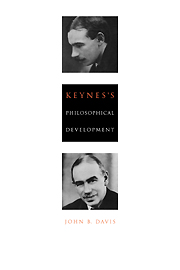Book contents
- Frontmatter
- Contents
- Preface
- Introduction: Keynes and philosophy
- 1 Keynes's early intuitionism
- 2 The dilemmas of Moore's Principia for ethics and economics
- 3 Keynes's self-critique
- 4 Keynes's later philosophy
- 5 The philosophical thinking of The General Theory
- 6 Ethics and policy
- Conclusion: Keynes's philosophical development
- Notes
- References
- Index
1 - Keynes's early intuitionism
Published online by Cambridge University Press: 28 August 2009
- Frontmatter
- Contents
- Preface
- Introduction: Keynes and philosophy
- 1 Keynes's early intuitionism
- 2 The dilemmas of Moore's Principia for ethics and economics
- 3 Keynes's self-critique
- 4 Keynes's later philosophy
- 5 The philosophical thinking of The General Theory
- 6 Ethics and policy
- Conclusion: Keynes's philosophical development
- Notes
- References
- Index
Summary
Historians of philosophy generally agree that the initially influential early Cambridge philosophy of Moore, Russell, and the young Ludwig Wittgenstein had by the 1930s been subjected to a decisive and quite far-reaching criticism since accepted by most philosophers (e.g., Passmore, 1966; Weitz, 1967). Indeed to recount this critique in detail would require a review of much of the development of modern Anglo-American philosophy, so pervasive and varied have been the changes and adjustments in contemporary philosophical thinking upon the early Cambridge project. This chapter only attempts to explain the critical reception of one important strand of this philosophy that Keynes inherited in his undergraduate years at Cambridge. Its objective is to elucidate a number of Keynes's early philosophical commitments, both because they have not received careful attention from previous scholars, and because understanding these commitments is central to the task of understanding Keynes's departure from them in his later philosophical thought.
In one respect, the discussion here builds upon recent efforts originating in Cambridge to explain Keynes's philosophy of probability in his Treatise on Probability (Lawson, 1985, 1988; Carabelli, 1988; Carvalho, 1988; O'Donnell, 1989; Runde, 1990, 1991). It holds to the view that Keynes developed and remained committed throughout his lifetime to a view of logic that premised non-deductive, non-conclusive, rational argument, and that a number of key themes from the Treatise concerning such matters as the different classes of probability judgments, inductive inference, and weight play a role in Keynes's later thought.
- Type
- Chapter
- Information
- Keynes's Philosophical Development , pp. 9 - 39Publisher: Cambridge University PressPrint publication year: 1994



